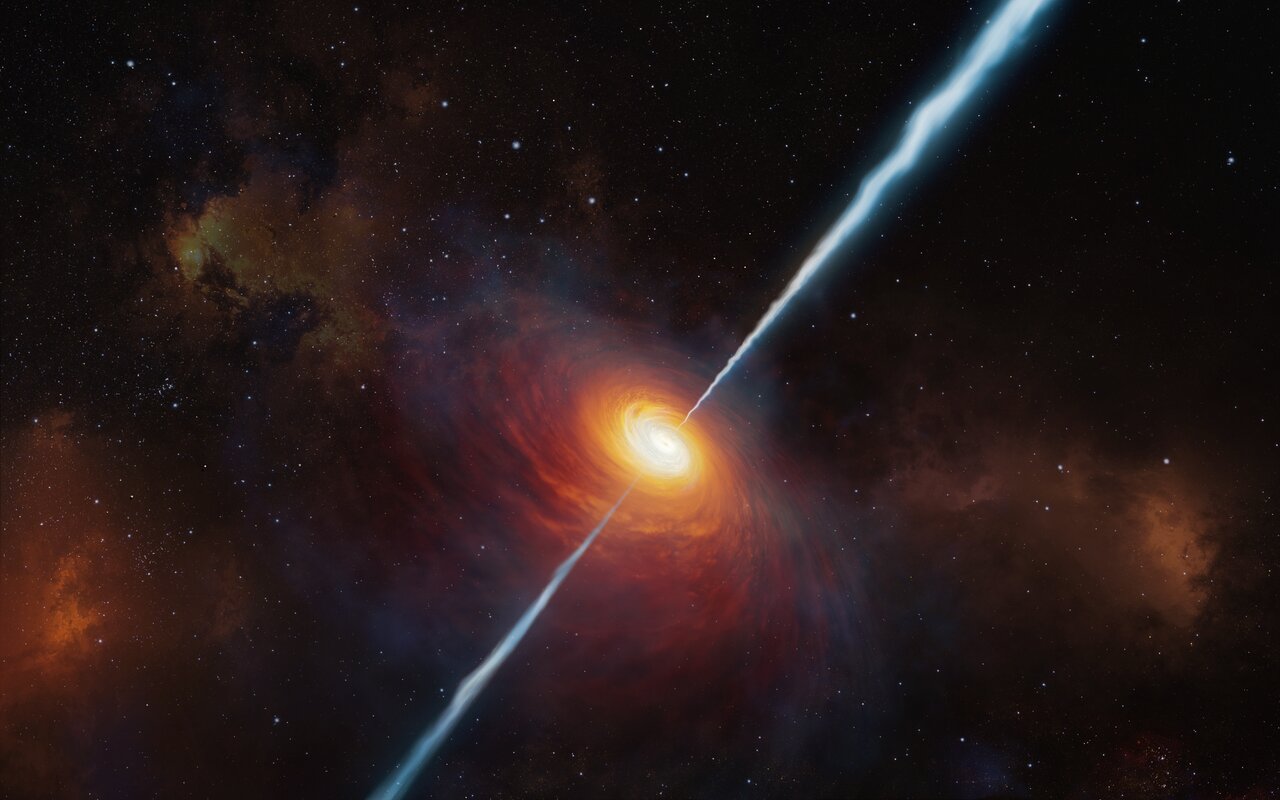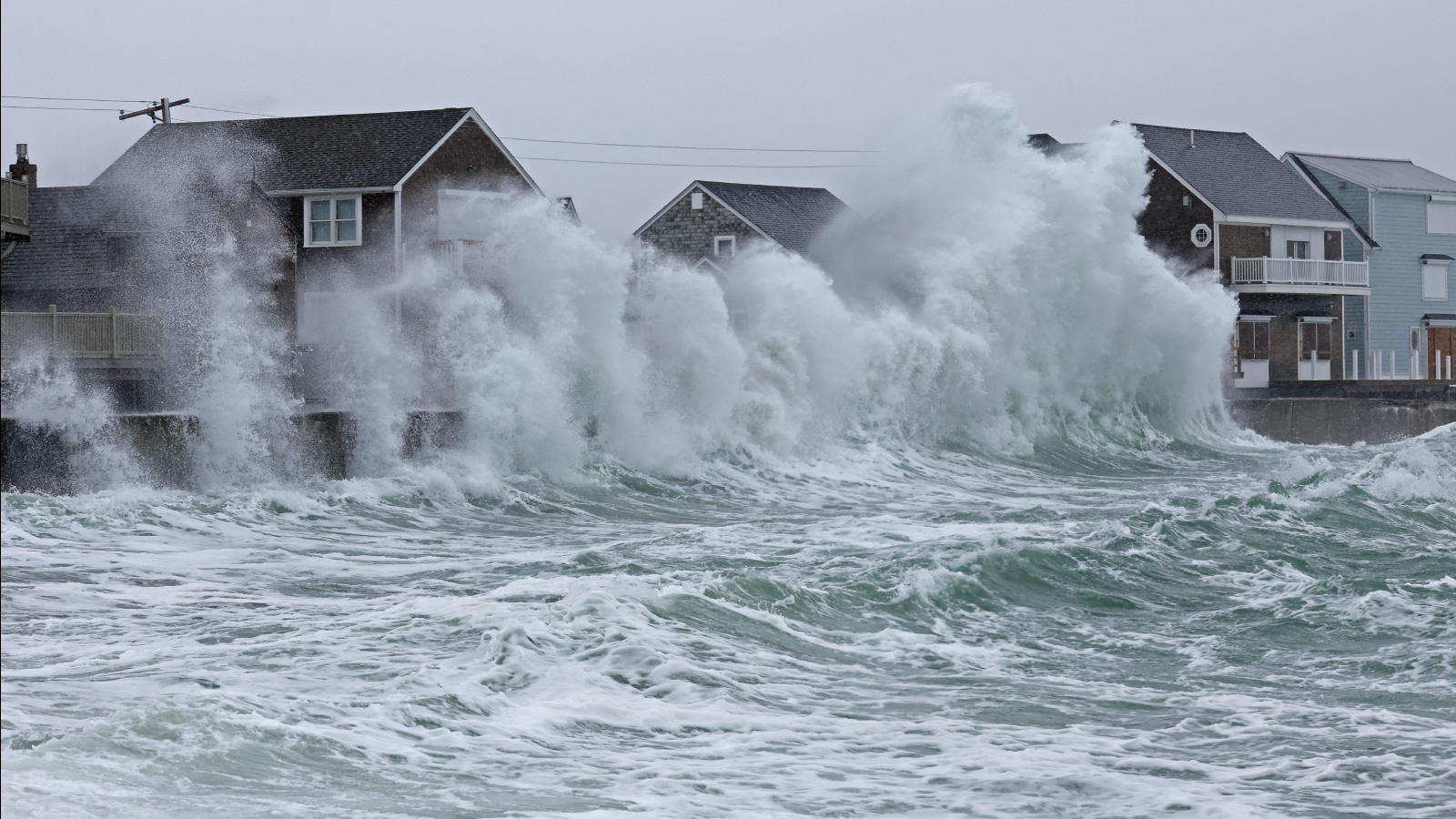Rare black hole 1 billion times the mass of the sun could upend our understanding of galaxy formation
The discovery of a hidden primordial black hole, which formed just 750 million years after the Big Bang, suggests that it may be the 'tip of the iceberg' of the cosmic monsters hiding in the early universe.

A rare supermassive black hole found hiding at the dawn of the universe could indicate that there were thousands more of the ravenous monsters stalking the early cosmos than scientists thought — and astronomers aren't sure why.
The primordial black hole is around 1 billion times the mass of our sun and was found at the center of the galaxy COS-87259. The ancient galaxy formed just 750 million years after the Big Bang and was spotted by the Atacama Large Millimeter Array (ALMA), a radio observatory in Chile, in a tiny patch of sky less than 10 times the size of the full moon.
Obscured beneath a cloak of turbulent stardust, the rapidly growing black hole was seen consuming part of its accretion disc of orbiting matter while spewing the leftovers out in a jet traveling close to the speed of light. The monster black hole appears to be at a rare intermediate stage of growth, somewhere between a dusty, star-forming galaxy and an enormous, brightly glowing black hole called a quasar.
And the cosmic behemoth could be just one of thousands of inexplicably large black holes lurking beneath the cloud cover of the early universe, the researchers suggest. They published their discovery Feb. 24 in the journal Monthly Notices of The Royal Astronomical Society.
"Frankly, explaining the existence of around 15 very early luminous quasars [from the same time period as COS-87259] was a big challenge for extragalactic astronomy given how short of a time there is to grow such a massive black hole since the Big Bang," lead study author Ryan Endsley, an astronomer at the University of Texas, Austin, told Live Science. "If very early billion-solar-mass black holes are thousands of times more common than we originally thought (as implied by our discovery, unless you assume we were incredibly lucky) this just exacerbates the problem further."
A supermassive mystery
Black holes are born from the collapse of giant stars and grow by ceaselessly gorging on gas, dust, stars and other other black holes in the star-forming galaxies that contain them. If they grow large enough, friction causes the material spiraling into the black holes' maws to heat up, and they transform into quasars — shedding their gaseous cocoons with blasts of light up to a trillion times more luminous than the brightest stars.
Get the world’s most fascinating discoveries delivered straight to your inbox.
Because light travels at a fixed speed through the vacuum of space, the deeper scientists look into the universe, the more remote light they intercept and the further back in time they see. Past simulations of the "cosmic dawn" — the epoch encompassing the first billion years of the universe — have suggested that billowing clouds of cold gas may have coalesced into giant stars that were doomed to rapidly collapse, creating black holes. As the universe grew, those first black holes may have quickly merged with others to seed even bigger supermassive black holes throughout the cosmos.
But how these chaotic conditions led to the creation of so many supermassive black holes is a mystery; one that is deepened by the possibility that the beasts could have numbered in their thousands when the universe had reached only 5% of its current age. One review paper has suggested that big, bright quasars are the easiest black holes to spot, so they are likely only the "tip of the iceberg" of the monsters hiding in the young cosmos.
The answer to this conundrum could point to a hole in our understanding of galaxy formation in the early universe. On Feb 22., another group of astronomers analyzing data from the The James Webb Space Telescope discovered a group of six gargantuan galaxies — aged between 500 to 700 million years after the Big Bang — that were so massive they were in tension with 99% of cosmological models.
A possible explanation may lie in the quantity and frenzied activity of the dense "starburst" clouds where the earliest black holes spawned. For instance, in April 2022, the discovery of another rapidly growing, transitioning black hole called GNz7q in a starburst galaxy the same age as COS-87259 showed that the galaxy was serving up freshly baked stars 1,600 times faster than the Milky Way does today. COS-87259 cooks at a slightly slower rate of 1,000 times the present Milky Way, yet its black hole is 20 times as massive and bright as GNz7q.
"The discovery of both COS-87259 and GNz7q within the past year was super surprising and really pushes us to ask how we can make sense of this from the standpoint of understanding very early supermassive black hole growth," Endsley said.

Ben Turner is a U.K. based staff writer at Live Science. He covers physics and astronomy, among other topics like tech and climate change. He graduated from University College London with a degree in particle physics before training as a journalist. When he's not writing, Ben enjoys reading literature, playing the guitar and embarrassing himself with chess.
